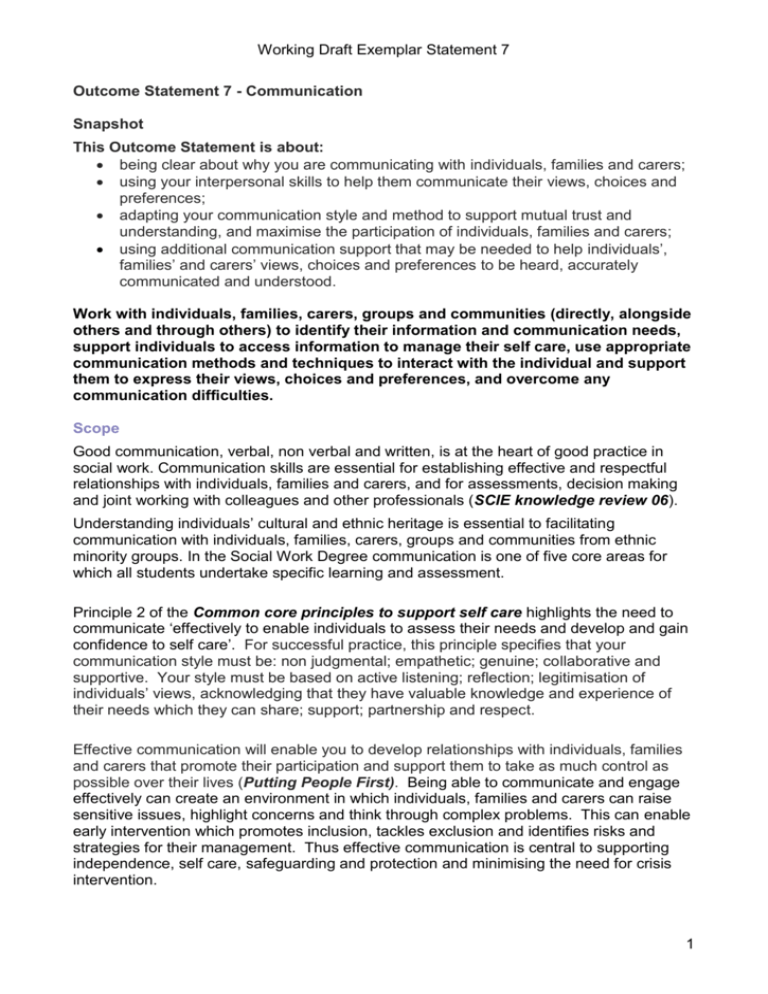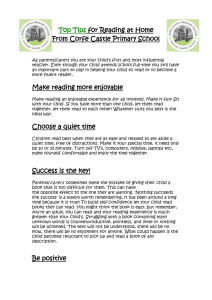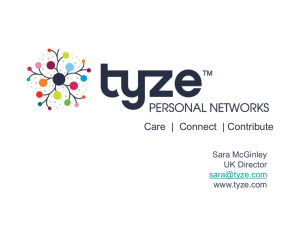Outcome Statement 1
advertisement

Working Draft Exemplar Statement 7 Outcome Statement 7 - Communication Snapshot This Outcome Statement is about: being clear about why you are communicating with individuals, families and carers; using your interpersonal skills to help them communicate their views, choices and preferences; adapting your communication style and method to support mutual trust and understanding, and maximise the participation of individuals, families and carers; using additional communication support that may be needed to help individuals’, families’ and carers’ views, choices and preferences to be heard, accurately communicated and understood. Work with individuals, families, carers, groups and communities (directly, alongside others and through others) to identify their information and communication needs, support individuals to access information to manage their self care, use appropriate communication methods and techniques to interact with the individual and support them to express their views, choices and preferences, and overcome any communication difficulties. Scope Good communication, verbal, non verbal and written, is at the heart of good practice in social work. Communication skills are essential for establishing effective and respectful relationships with individuals, families and carers, and for assessments, decision making and joint working with colleagues and other professionals (SCIE knowledge review 06). Understanding individuals’ cultural and ethnic heritage is essential to facilitating communication with individuals, families, carers, groups and communities from ethnic minority groups. In the Social Work Degree communication is one of five core areas for which all students undertake specific learning and assessment. Principle 2 of the Common core principles to support self care highlights the need to communicate ‘effectively to enable individuals to assess their needs and develop and gain confidence to self care’. For successful practice, this principle specifies that your communication style must be: non judgmental; empathetic; genuine; collaborative and supportive. Your style must be based on active listening; reflection; legitimisation of individuals’ views, acknowledging that they have valuable knowledge and experience of their needs which they can share; support; partnership and respect. Effective communication will enable you to develop relationships with individuals, families and carers that promote their participation and support them to take as much control as possible over their lives (Putting People First). Being able to communicate and engage effectively can create an environment in which individuals, families and carers can raise sensitive issues, highlight concerns and think through complex problems. This can enable early intervention which promotes inclusion, tackles exclusion and identifies risks and strategies for their management. Thus effective communication is central to supporting independence, self care, safeguarding and protection and minimising the need for crisis intervention. 1 Working Draft Exemplar Statement 7 In developing and extending your communication skills, you will be giving personalised assistance to individuals, carers and families in exercising as much choice and control as they wish to have over the way their needs and preferred outcomes are defined, and the choice of responses to them. In some cases, there will be severe communication problems to overcome before establishing a rapport and considering options. In others, the skills and knowledge required will be those of knowing intimately the range of formal and informal support services and networks available to draw on, and enabling the individual, with carers or family if they wish to involve them, to select the package which best complements their own resources, fits their preferences and delivers the outcomes they want. You as a NQSW have a duty for provide information, advice, assistance and brokerage in formats that are relevant, useable and understandable to individuals, their families and carers. Many individuals, carers, families, groups and communities you work with may not have English as their first language, or will need specific forms of communication because of age, disability, disadvantage, intellectual impairment, or traumatic experiences. Using appropriate language and communication methods, media and skills will ensure that individuals have the information they need to make their views, choices and preferences known and to fully be involved in, and influence decisions that affect their lives. You will need to use appropriate communication skills when working with ethical dilemmas, interpersonal tensions and conflicts of interest that may undermine the individual’s capacity to participate and make decisions about their lives and future. This may involve you commissioning and working with interpreters and translators. Advocacy is important in ensuring that individuals’ views, choices and preferences are understood and their rights protected, especially when they wish to compliment, make a representation or complain. Any expression of concern about the quality of service should always be treated seriously and whenever possible you should try to reach a resolution to any concerns. When this is not possible you will need to ensure that individuals, families and carers know about their right to make a formal complaint and how to do this. Active listening (defined as receiving, understanding and processing a communication from others whatever the form and media used to produce and communicate the message), providing information for and communicating and engaging with individuals, families and carers are essential to individual development, promoting individuals’ confidence and their ability to cope with changing circumstances and demands. The local authority has a duty to provide information relating to eligibility criteria, the provision of services and support, publications that may be of benefit to individuals, families and carers. As a social worker your first contact with individuals, their families or carers may be to give them information. Often the circumstances may be stressful for them, and it is important that you provide information in a way that is appropriate to the family’s level of understanding. Information should be up-to-date, accurate, given in good time, in accessible formats, jargon free and culturally appropriate. You are responsible for ensuring that appropriate levels of confidentiality and anonymity are maintained Legislation and statutory guidance To inform your communication responsibilities, you should have a good working knowledge of the legislation and guidance relating to the social care needs, approaches to assessment, and entitlements of working age adults and older people. Key legislation and guidance includes: 2 Working Draft Exemplar Statement 7 National Assistance Act 1948 and Chronically Sick and Disabled Persons Act 1970 - basis for identifying the needs of disabled and older people, and discussing with them the services available. NHS and Community Care Act 1990 and associated guidance - new framework for assessment with individuals and families of their care needs, and care management arrangements for individual packages of services. Community Care (Direct Payments) Act 1995 - option for individuals to receive cash instead of services to meet assessed need. Regulations have extended the groups eligible for direct payments, and required local authorities to offer them as an option to all adult clients, as well as parents of disabled young people, and disabled people themselves between 16 and 18. Fair Access to Care Services guidance (2002) provided national definitions for four eligibility bands to be used by local authorities in assessing and prioritising needs. They define both “life and limb” risks to individuals’ health and safety, and also threats to social inclusion by denying opportunities to work and participate. Mental Capacity Act 2005 defines and limits the circumstances in which a person can be deemed to lack capacity, and makes provision for advocates to be appointed to protect their interests. Mental Health Act 2007 introduces statutory provision for supervised community treatment, redefines the role of the nearest relative and extends it to civil partners, gives statutory access for qualifying patients to an Independent Mental Health Advocate to help them understand and exercise their rights, and extends the groups who can act as Approved Mental Health Professional and Approved Clinician. Health and Social Care Act 2008 extends access to direct payments to those who lack capacity, makes clear a spouse or civil partner cannot be charged for an individual’s residential care, and creates a National Information Governance Board to oversee the handling of people’s confidential health and social care information. The individual’s general rights to see and correct information held on them are set out in the Data Protection Act 1998 and associated guidance and codes. Policy context The involvement of individuals, and where appropriate their carers and families, in assessment of their needs and aspirations and the options for meeting them has been a core principle of social care policy for at least the last 20 years, as reflected in the following documents: 1989 Caring for People White Paper, and the practice guidance produced by the Department of Health to support implementation of the NHS and Community Care Act 1990 reforms to community care. 1995 Direct Payments legislation, regulations and guidance, responding to lobbying by the disability movement for more control over how their social care needs were met. Many working-age disabled people opted to employ people as personal assistants to provide them with individually tailored support. As numbers on direct payments have grown, so have variations in the way they have been used. Independence, Wellbeing and Choice, the 2004 adult social care Green Paper, sought to extend the same degree of choice and control to much larger numbers of people who wish to determine how their resources are used, but not necessarily to take responsibility for employing staff or purchasing services from providers. It highlighted the work of InControl in developing models of self-directed support, 3 Working Draft Exemplar Statement 7 often based on self-assessment, enabling people to use resources in innovative ways to achieve the outcomes they wanted in a manner that suited them best. It also described a role of navigator or broker, whose task was to guide people round the complexities of the wider social care systems, including housing, training, employment, transport and benefits as well as LA-funded social care, and to negotiate a package of services that best suited the individual’s needs and preferences. The Green Paper proposals were endorsed in the subsequent White Paper Our Health, Our Care, Our Say Putting People First, the 2007 joint protocol, signed by a number of government departments and partner agencies, set out a 20-point action programme for implementing policies for personalisation at national, regional and local levels, and implementing major changes to the whole care system and its relationship to other sectors. .Other government strategies over recent years reflecting similar principles include Increasing Life-chances for disabled people ( ), the Independent Living Strategy ( ), Valuing People Now ( 2007 ), the Dementia Strategy (2009), and the work of the Social Exclusion Unit and its successor Task Force under the heading Think Family ( ). Evidence that demonstrates that you have met the statement You must provide evidence from your work that you have: selected, used and complied with appropriate, up-to-date legislation and statutory guidance and relevant local procedures (including those related to multi-agency working); demonstrated the behaviours required by Principle 2 of the Common core principles to support self care including the need to: demonstrate enhanced understanding, skills and confidence to communicate with individuals to address their needs ensure that individuals’ questions and concerns are listened and responded to in a way that respects their dignity, enhances their ability to make choices and supports their independence ensure that the boundaries of confidentiality are clearly explained to individuals communicate effectively on difficult, complex and sensitive issues support individuals to communicate their needs and choices identify and develop ways to communicate effectively with individuals with different communication needs and work with them to identify the best forms of communication, seeking advice and support when needed develop skills which elicit an individual’s strengths, areas for development, their own understanding of their self care needs and their capacity and willingness to self-manage enable individuals to explore their beliefs about their needs using approaches that promote choice, independence and management of change evaluate communication methods and systems to ensure they respect individuals’ right to choice, dignity and independence communicate effectively with families and carers, where appropriate, about the individuals’ needs for self care, and respond to any conflicts of interest in ways that aim to support the rights of all involved assessed the communication needs of individuals, families, carers, groups and communities; 4 Working Draft Exemplar Statement 7 sought appropriate independent representation, advocacy, interpreters, translators and alternative forms of communication to meet the identified needs and preferred outcomes of individuals, families and carers; communicated with individuals who have different communication needs and levels of complexity, working alongside and through others, where appropriate; listened to individuals in order to understand their needs and aspirations, and accurately recorded the content and focus of their communications; listened to families, carers, groups and communities in order to understand their perspectives, concerns and preferred outcomes, balance their needs with those of the individuals, and identify common ground and any differences; accurately recorded the individuals’ views, choices and preferences and the views of families, carers, groups and communities about these, and identified, recorded and addressed any conflicts of views, choices and preferences provided information which is jargon free, culturally appropriate and accessible, in good time and in appropriate formats; discussed, confirmed, reviewed and recorded with your line manager/supervisor and through supervision the outcomes sought and achieved for the individuals in the context of your decisions, recommendations and interventions. For each of the above you may use as sources of evidence instances where you have: communicated directly with individuals, families, carers, groups and communities communicated directly and/or indirectly while sharing responsibilities with more experienced workers or workers with different skills and expertise communicated directly and/or indirectly when tasks and responsibilities are being carried out by others workers in your own or another organisation but where you remain accountable for the quality of their work The sources of evidence for each of the above should be agreed with your supervisor or line manager 5







